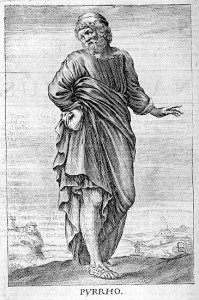Thus far in this series, we’ve found the world’s first Naturalistic Pagans in the Greek Ionians, Atomists, and Epicureans, with potentially-naturalistic cousins in the Cynics and Stoics, and a generally conducive atmosphere among the Greek populace. Now we come to a tradition with strong naturalistic leanings: the ancient Skeptics. Examining this complex tradition reveals another potentially naturalistic tradition, and teaches us something important about the definition of naturalism.
This post is part of Naturalistic Traditions, a column exploring naturalism in Pagan ways. The present series explores the historical roots of naturalistic ways in order to gain an expanded sense of the historicity of the diverse styles of belief common in Paganism today.
Ancient Skepticism
“Skeptic” is a familiar word these days, and ancient Skeptics were both like and unlike those of today. Like modern skeptics, they were suspicious of dubious factual claims. However, unlike those today, they applied this doubt not only to the paranormal and supernatural, but to all claims whatsoever. Beliefs of all kinds were subjected to questioning.
In fact, the only thing that wasn’t doubted was the senses as they appear to a person at a given moment. It is perfectly evident that honey tastes sweet to you, they would say, but not that honey is necessarily sweet in and of itself. Any kind of statement about the essential nature of things was met with rigorous argumentation. The point of this debative stance was a tireless pursuit of truth, and – according to some – a life of tranquility, free of dogma.
How did this attitude work out as a philosophy of life? That depended on the particular school of Skepticism, of which there were two: the Academics and the Pyrrhonists. Each of these arose in response to particular social environments, so we’ll do well to explore them in their respective historical contexts.
Socrates and Pyrrho
 The story goes that a man asked the Oracle at Delphi who the wisest person in the world was, and the reply was “Socrates.” When Socrates heard of this, he wondered how this could be true. Perhaps it meant that he, unlike most people in the world, at least knew he wasn’t wise. While this story may not be historically accurate, it dramatizes an essential aspect of Socrates’ method: questioning others’ assumptions while rarely and only hesitantly advancing claims of his own. After all, Socrates’ inquiries into truth usually ended without any final conclusion.
The story goes that a man asked the Oracle at Delphi who the wisest person in the world was, and the reply was “Socrates.” When Socrates heard of this, he wondered how this could be true. Perhaps it meant that he, unlike most people in the world, at least knew he wasn’t wise. While this story may not be historically accurate, it dramatizes an essential aspect of Socrates’ method: questioning others’ assumptions while rarely and only hesitantly advancing claims of his own. After all, Socrates’ inquiries into truth usually ended without any final conclusion.
This aspect was made central by one of his students, Pyrrho of Elis (c. 365 – 275 BCE). This philosopher, who had accompanied Alexander the Great on his campaigns to India and may have learned from Indian thinkers, questioned all claims to truth. Finding no convincing arguments to either support or deny such claims, he ended up suspending judgment altogether. In wake of this suspension, called epoche, he discovered tranquility of the mind. This was ataraxia, or freedom from disturbance.
Many philosophers of the day were seeking just such a state of mind. They proposed to obtain it via true knowledge of what was and was not good for a person. What was radical about Pyrrho’s solution was that he found the goal not in some unimpeachable truth, but rather in the realization that all knowledge appears to be faulty. It was not the product of reason, but rather the recognition of its limits, that yielded tranquility. Giving up the search for infallible truth, he stumbled upon the very thing other philosophers were looking for: an ideal state of mind.
Pyrrho was, in fact, renowned in his own day for his tranquility. On a sea voyage tossed by storms, while other men prayed to the gods, he pointed to a pig happily eating and said we need not fret any more than the pig (Thorsrud, 2009). Another story qualifies this: after being criticized for showing terror in response to an onrushing dog, Pyrrho replied that it is difficult to entirely strip off one’s humanity (Thorsrud, 2009). In other words, normal human impulses remain part of our makeup; it is reasoned beliefs about whether things are genuinely good or bad that must be rejected. One could exaggerate this position to extremes, as in the almost-certainly spurious account that Pyrrho held his senses in such disregard that his friends had to keep him from wandering into the path of wagons, dogs, and precipices. This story is not at all in the spirit of later Skepticism, and is contradicted by the report of Pyrrho’s own student Timon, who says his master “did not depart from normal, habitual, customary practice” (Thorsrud, 2009). In short, Pyrrho’s tranquility appears to have been the product of suspending judgment about whether things are good or bad, and then getting on with life as any other person would.
The philosophy of Pyrrho was recorded by Timon, but otherwise under-appreciated until much later. In the meantime, another kind of Skepticism was developing within the Academy of Plato.
Plato and the Academics
 Plato is not generally considered a Skeptic, but it is notoriously difficult to pin down exactly what his beliefs were. He wrote in dialogues, putting ideas into various characters such as Socrates and his interlocutors, and it is not clear which voice, if any, is meant to stand for Plato. This aspect was recognized by the third successor to Plato’s Academy, Arcesilaus (316 – 241 BCE). Feeling that previous successors had misunderstood Plato as a doctrinaire, Arcesilaus attempted a revival by returning to indeterminism. Instead of asserting Platonic forms and other such dogmas, he focused on questioning unfounded assumptions.
Plato is not generally considered a Skeptic, but it is notoriously difficult to pin down exactly what his beliefs were. He wrote in dialogues, putting ideas into various characters such as Socrates and his interlocutors, and it is not clear which voice, if any, is meant to stand for Plato. This aspect was recognized by the third successor to Plato’s Academy, Arcesilaus (316 – 241 BCE). Feeling that previous successors had misunderstood Plato as a doctrinaire, Arcesilaus attempted a revival by returning to indeterminism. Instead of asserting Platonic forms and other such dogmas, he focused on questioning unfounded assumptions.
Soon, other schools of philosophy, especially Stoicism, came under attack from the Academy. These schools affirmed that human flourishing rested in the attainment of certain infallible truths. The Stoics called these kataleptic impressions, or propositions so compelling they must be true. For all lesser notions, the Stoic sage was supposed to withhold assent. Using this same logic, the Academicians questioned the so-called infallible truths of other schools and found none able to stand up to the schools’ own logical standards.
There was a difference between the Skepticism of the Academy and that of Pyrrho, though. Pyrrho had placed arguments for and against a claim in opposition and found them equally compelling. The Academics, in contrast, found no claims infallible but still found some better than others. In particular, some could be guides for action. This appears to have begun with Arcesilaus, from whom we have a lone reference to guiding actions by “the reasonable” (to eulogon) (reference via Sextus Empiricus; Thorsrud, 2009). It was then extended by the fourth head of the Academy, the master debater Carneades (214 – 128 BCE), who put forward a criterion of probability. Carneades thought actions could be guided by what appeared most probable based on its consistency with other appearances, in the same way that assemblies question multiple witnesses to corroborate a story (Thorsrud, 2009). The final step was taken by Cicero (106 – 43 BCE), who employed the notion not only to guiding actions but also to making progress towards truth (Thorsrud, 2009). According to this innovative Academic view, absolute truth was likely unattainable, but a kind of provisional truth could bring us closer to it. Probable ideas could be taken as true until overturned by new evidence implying a still more probable conclusion. This fallibilism, as the position is called today, is essentially the epistemological basis of modern scientific method.
After Carneades, the Academy began to flounder and was already in decay by the time of Cicero, who felt compelled to defend against claims that he was championing a lost cause. Apparently unbeknownst to him, however, a different Skeptical movement was alive and growing.
The Pyrrhonist Revival
 Not everyone was happy with the Academic compromise of provisional truth; some felt even this was too dogmatic. One such person was Aenesidemus (1st cen. CE), who chastized the Academy and urged a return to Pyrrho. Skeptics in this new line were called Pyrrhonists after their adopted role model. Their method was to pose arguments one against another until they found them equally compelling. This led to epoche or suspension of judgment, which in turn gave way to speechlessness and then tranquility.
Not everyone was happy with the Academic compromise of provisional truth; some felt even this was too dogmatic. One such person was Aenesidemus (1st cen. CE), who chastized the Academy and urged a return to Pyrrho. Skeptics in this new line were called Pyrrhonists after their adopted role model. Their method was to pose arguments one against another until they found them equally compelling. This led to epoche or suspension of judgment, which in turn gave way to speechlessness and then tranquility.
We know a fair amount about this school thanks to a book by Sextus Empiricus (late 2nd cen. CE) called Outlines of Pyrrhonism. Despite this resource, it remains a difficult philosophy. The Academic could base actions on the most probable beliefs, but the Pyrrhonists explicitly rejected this as dogmatic. So, how did the Pyrrhonists get on with life without beliefs?
Thorsrud (2009) explores in detail the various possible responses to this thorny problem. To simplify considerably, the Pyrrhonist can be led by perceptions without beliefs in the same way that a bee can be led to a flower without any rational cognition on its part. This is not to suggest the Pyrrhonist aspires to thoughtlessness, only that it is possible to act without assenting to any beliefs, provisional or otherwise.
As a matter of fact, the Pyrrhonist led a fairly ordinary life of action, as made clear by Sextus Empiricus’ fourfold observances:
So, adhering to experience, we live undogmatically in the conduct of life, since we cannot be totally ineffectual. It seems that this conduct of life has four aspects: (1) guidance by nature; (2) submission to our feelings; (3) traditional laws and customs; and (4) skills training. (Sextus Empiricus, Outlines of Pyrrhonism)
Here, “guidance by nature” means reliance on sense experiences and thoughts, and “submission to feelings” means heeding things like hunger and thirst. “Traditional laws and customs” means more or less accepting the ways of one’s society – which may sound strange given the Pyrrhonists’ radical doubt of all beliefs, but keep in mind they say ideas can neither be proved nor disproved. Finally, “skills training” refers to practical, concrete learning in useful trades. In other words, Pyrrhonists forget about Truth with a capital “T”, guide their actions in these four ways, and then simply get on with the business of living.
After Sextus Empiricus, Skepticism died out. The recovery of his book in the Renaissance by such thinkers as Pico de Mirandola and Savanarola led to a revival, however. Gassendi, a leading figure in early modern science, explicitly wrestled with Pyrrhonism as he worked out a basis for scientific discovery. What eventually resulted was a kind of fallibilism not unlike that of the Academics. The spirit of Skepticism would continue to inspire later thinkers, including Montaigne, Descartes, Hume, Kant, and Husserl. Thus, ancient Greek Skepticism played a crucial role in the development of modern science.
Were Skeptics naturalistic?
If ancient Skepticism was so influential in the development of modern science, it stands to reason that it might be a good place to look for the philosophy that underpins it: naturalism. Perhaps unsurprisingly, though, its relation to naturalism is complicated, and depends on the school in question.
The Pyrrhonists were decidedly not naturalistic. Why? Like today’s atheists and agnostics, they did not hesitate to point out the dubiousness of theological dogma, so wouldn’t that make them naturalistic? In fact, the answer is no. Pyrrhonists questioned all beliefs, including naturalistic ones. Strictly speaking, they were no more naturalists than theists. They would have rejected both positions as overly dogmatic.
Naturalists today may not consider their philosophy dogmatic, but ancient Pyrrhonists would have disagreed. Surely they would have looked askance at the elaborate scientific theories accepted by naturalists, such as general relativity or quantum mechanics, which often go beyond what is immediately apparent to the senses. It is commonplace, for example, for scientists to operate on the basis of theoretical constructs long before they are demonstrated by observation. Atoms, for example, have been a staple of science since Gassendi, but were not directly observed till recent years via quantum microscopy. For this the Pyrrhonist would have no patience. Though the naturalist may object that such theories are only taken as provisionally true, contingent on evidence, it is hard to imagine a Pyrrhonist brooking such objections. It was precisely this notion of provisional truth which they found unacceptably dogmatic in the Academics.
Speaking of which, the Academic Skeptics might have been a bit more friendly to science, since its fallibilism bears a clear resemblance to their own. They would have appreciated the objection of the naturalist above. Still, one must wonder if Carneades would have accepted the core tenets of naturalism. Likely he would have asked for clarification, and this is where things would have gotten complicated, because few naturalists today give coherent and consistent explanations of their philosophy.
At this point, I must beg the readers’ forgiveness for getting on my soapbox, since the current issue is pertinent to a theme running throughout this series: the definition of naturalism.
What Skepticism teaches us about naturalism
Some say naturalism is defined by rational inquiry based on evidence and logic, but Carneades would point out that apologists such as William Lane Craig employ rational arguments based on evidence and logic while remaining firmly theistic. Others say naturalism is defined in relation to science, but some of its greatest minds, such as Isaac Newton, were theists, and there remains a small but significant minority of theistic scientists today. Still others say naturalism believes in whatever is real, so that if magic were proved true it would become natural, but this would appear as moving the goalposts to Carneades – it makes naturalism irrefutable by any means, which is surely a red flag. Finally, there are those who hold that naturalism is the claim that only those objects which are in principle open to scientific investigation exist, yet this would give Carneades a hearty laugh: Can you prove nothing else exists, he would ask, or is that just your personal dogma?
Such definitions of naturalism are easily revealed as inadequate. To meet the Skeptic’s challenge, what is needed is a definition neither pegged to rationality, science, or “reality” (though it will surely uphold all three), nor immune to falsification, but which affirms a provisional hypothesis open to disconfirmation by new evidence.
The definition of naturalism employed in this series attempts to meet this challenge. It follows Littré’s 1875 French dictionary in upholding naturalism as “the system of those who find all primary causes in nature” (Furst and Skrine, 1971), while understanding “nature” as characterized by impersonal physical laws (see part 1 for a more detailed explanation). This definition does not rely on idiosyncratic, anachronistic, and potentially-ethnocentric notions of rationality or reality. It is closely related to modern science, but does not depend on it, and in fact may be disproven by science: if there ever came a time when new evidence revealed an entity which was ultimately personal, without physical substrate, or immune to known laws of nature, that would disconfirm naturalism. Until such a time, naturalism appears to be the current best explanation for the universe as we know it, making it consistent with the Academic affirmation of provisional truth.*
If I have not mis-characterized Academic Skepticism or naturalism, then it appears the two could agree to live comfortably under the same roof. Carneades may have approved of such an epistemologically-grounded, fallible naturalism.
Is Academic Skepticism therefore naturalistic? No ancient Academic ever hypothesized that nature might be the sole source of causes, nor that nature was characterized by impersonal physical laws. All of them were resolved to follow the evidence, however, and naturalism appears to be the best current explanation of the evidence. There is thus a natural sympathy between the two.
Still, I would not necessarily call Academic Skeptics naturalists, for the following reason: naturalism is a specific worldview, and Academics did not hold that worldview. Rather, they held the epistemology which underlies it, and could very well argue against it. For instance, if new evidence came to light that disconfirmed naturalism, as entertained above, naturalism would be struck down but Skepticism would remain. For this reason, Academic Skepticism as a system must be characterized as non-naturalistic.
Truth be told, in its post-Classical career, Skepticism has been more often employed in favor of the supernatural than the natural. In the hands of theologians of various religions, including Augustine (Christian), Moses Maimonides (Jewish), and al-Ghazzali (Muslim), Skeptical arguments were deployed to undermine reason, making room for knowledge by revelation alone (Kuzminski, 2008). This position, called fideism, is an imperfect application of the Skeptic’s toolkit, since an Academic would surely have doubted revelation as well, but it nevertheless demonstrates how flexible its applications are. Skepticism need not yield naturalism as a matter of necessity.
Despite this, it is entirely possible that individual Academics could have been fully naturalistic. There was nothing to stop them from holding to naturalism provisionally. Moreover, Skepticism strongly conduces to naturalism given exposure to the right evidence. For example, one might imagine that an Academic magically made aware of such modern data as fossil records and DNA markers would provisionally accept the theory of evolution over creationism. Similarly, some Academics exposed to ancient naturalists such as Democritus or Epicurus might have taken their evidence-based arguments as provisionally true, if not infallibly so. Admittedly, there are no known records of such provisionally-naturalistic Academics. Nevertheless, the arsenal was levied against infallibility, not reasonability, so individual Academic naturalists could have emerged.
For example, Cicero, in a letter to a friend, seems to accept the Epicurean argument against life after death based on the notion that death is an absence of sensation and thus no ill.
Naturalistic Pagans?
One final question remains. Now that we’ve discovered a strong potentiality for naturalism among one school of Skeptics, namely the Academics, it remains to be investigated whether they also incorporated Pagan religious practices, i.e. whether they were Naturalistic Pagans.
On this point, the Pyrrhonists are clear. Sextus Empiricus states explicitly that the Pyrrhonist will continue to carry out traditional sacrifices, even though withholding ultimate belief in the deities to which they are offered. This is guided by the fourfold observances, as quoted above. As we’ve seen, however, the Pyrrhonists were not naturalistic, so we need proceed no further.
As for the Academics, the picture is again complicated. They may well have engaged in Pagan religious practices while provisionally holding a naturalistic view. Unfortunately, there is no evidence of any of them doing so.
Carneades provides arguments against the immortality, benevolence, and transcendence of deities, but these are logical exercises and should not be taken as indicative of his true views on religion. Nor is it made clear whether he or other Academics shared the Pyrrhonist predilection of following traditional customs (see above). Hence, it is hard to speak of his religious practices.
Cicero, on the other hand, is a bit more forthcoming. He was an official augur (a kind of diviner), which was an extremely powerful position in the Roman republic. Though he writes in favor of it, he appears not to have placed any faith in its veracity. His On Divination sets out the arguments in favor of it and then crushes them. Why, then, did Cicero approve of divination? The explanation is that he saw it as useful as a political tool for controlling the masses by means of religion (Clayton). This view may sound cynical and elitist, and perhaps it is, but it was common among ancient philosophers (compare Plato’s famous “noble falsehood”). Moreover, this is a clear instance of finding traditional religious practices beneficial while maintaining a non-traditional view. If Cicero was a naturalist, he would have been a Naturalistic Pagan.
It is not clear that Cicero was a naturalist, though. Hooper (1917) analyzes his letters to friends, which are taken to be more accurate depictions of his real views, and demonstrate numerous instances in which Cicero appears to sincerely invoke the gods, such as his words to Brutus: “If some god had not given that mind to Octavianus Caesar, we should have been lost” (Hooper, 1917). This seems to reveal Cicero as a closet theist, at least on Hooper’s interpretation. Elsewhere, Cicero chooses to provisionally adopt Stoic views on politics and ethics on the grounds that they are useful (Clayton), but nowhere does he so adopt the more clearly naturalistic views of the Epicureans (in fact, he held Epicureanism in disdain for most of his career). For these reasons, Cicero does not appear to have been a naturalist, hence not a Naturalistic Pagan.
In summary, there is no evidence of any Academic Skeptic provisionally adopting naturalism as a worldview, much less combining it with traditional religious practices. Nevertheless, there was nothing to stop an Academic from doing so, and individuals unknown to the historical record may well have done just this. Academic Skepticism thus represents another case of potentially Naturalistic Paganism.
*Of course, there may be holes in this definition I haven’t yet noticed, and if so I hope some modern-day Carneades will point them out!
References
Clayton, E. “Cicero (106—43 B.C.E.).” Internet Encyclopedia of Philosophy. Retrieved February 24, 2014, from: http://www.iep.utm.edu/cicero/#SH7m
Hooper, W. D. (1917). “Cicero’s Religious Beliefs.” The Classical Journal, 13(2).
Furst, L. and Skrine, P. (1971). Naturalism. London: Methuen.
Kuzminski, A. (2008). Pyrrhonism: How the Ancient Greeks Reinvented Buddhism. Plymouth, UK: Lexington Books.
Long, A. A. and Sedley, D. N. (1987). The Hellenistic Philosophers, Vol. 1. New York: Cambridge University Press.
McEvilley, T. (2002). The Shape of Ancient Thought: Comparative Studies in Greek and Indian Philosophies. New York: Allworth Press.
Parker, R. (2011). On Greek Religion. Ithaca, NY: Cornell University Press.
Sextus Empiricus. (2000). Outlines of Scepticism. Annas, J. and Barnes, J., ed. New York: Cambridge University Press.
Previous posts in this series
- Exploring the historical roots of Naturalistic Paganism
- Modern cosmology
- Evolution and the way to live
- Were early hunter-gatherers naturalistic?
- Were early agriculturalists naturalistic?
- Were archaic Egypt and Mesopotamia naturalistic?
- Was archaic Greece naturalistic?
- Were the Ionian philosophers naturalistic?
- Were the Classical Greeks naturalistic?
- Were Epicurus and the atomists naturalistic?
- Were the Cynics and Stoics naturalistic?
Naturalistic Traditions is published monthly. Subscribe via RSS or e-mail!


















